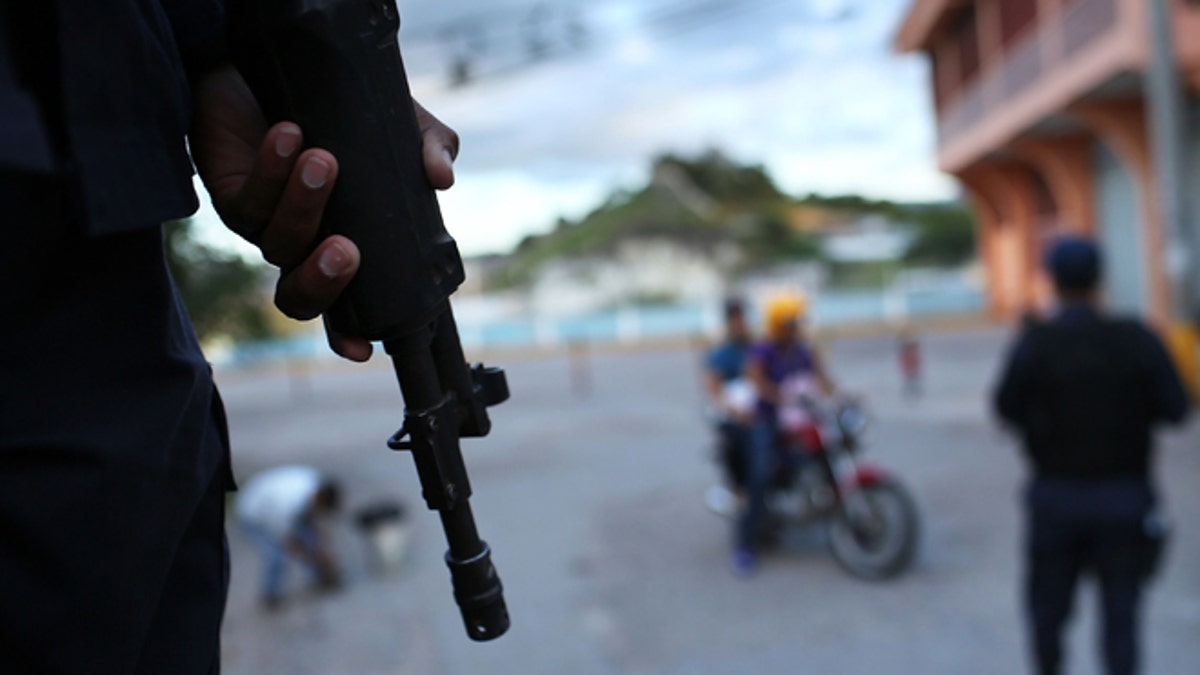
TEGUCIGALPA, HONDURAS - JULY 20: Police patrol the streets of a gang ridden neighborhood on July 20, 2012 in Tegucigalpa, Honduras. Honduras now has the highest per capita murder rate in the world and its capital city, Tegucigalpa, is plagued by violence, poverty, homelessness and sexual assaults. With an estimated 80% of the cocaine entering the United States now being trans-shipped through Honduras, the violence on the streets is a spillover from the ramped rise in narco-trafficking. (Photo by Spencer Platt/Getty Images) (2012 Getty Images)
The divisive and ongoing border crisis has cast a glaring spotlight on the overwhelming problems in Central America, which have driven tens of thousands to the United States since last fall.
In many ways, the poverty and drug- and gang-related violence that's rampant in Guatemala, Honduras and El Salvador are similar to the situation in Mexico and Colombia, where the U.S. has invested heavily in the local security forces and humanitarian aid under the Merida Initiative and Plan Colombia, respectively.
In comparison the amount of money sent by Washington to the Central American countries is relatively small. Funding from both the State Department and the U.S. Agency for International Development (USAID) has ramped up in the last decade, but it still pales in comparison to the billions given to Colombia and Mexico.
The State Department reported that since 2008, it has allocated $642 million under the Central American Regional Security Initiative (CARSI) to the Central American countries in an effort to combat crime and strengthen the rule of law in the region.
Some analysts, however, dispute the figure and say that, even if accurate, it isn't nearly enough given that the money is divided between thirty or so programs in the seven countries, so any given initiative only receives about $100,000 to $200,000 a year.
“It’s a drop in the bucket,” Adam Isacson, senior associate at the Washington Office on Latin America, told Fox News Latino.
CARSI funding was meant to bolster both security forces in Central America and counter the influence of criminal organizations. This, however, has not proved the case as violent crime rates in what is known as the "northern triangle" – Guatemala, El Salvador and Honduras – has soared.
Honduras has the highest per capita murder rate in the world - 79 per 100,000 people last year – and those in El Salvador and Guatemala are only slightly better.
CARSI’s funding mainly goes to support anti-drug and anti-gang measures with much of the humanitarian money being distributed through USAID, the agency responsible for administering civilian foreign aid.
USAID gave the three northern triangle nations about $187 million in 2012 – the same year the agency handed out $311.4 million to Kenya for health projects alone.
USAID’s main work in addressing poverty and violence in Central America has been to try to get young people into the workforce and away from gang life. Taking cues and support from places like New York City and Los Angeles, the agency has built more than a hundred youth centers around the region in the hope of increasing educational and labor opportunities.
“It’s not a losing battle we’re fighting down there,” Mark Feierstein, the deputy administrator of USAID told FNL. “We’re trying to target the most at-risk youth and provide them with a safe haven.”
The problem, according to both U.S. officials and analysts, is twofold: first, the current level of funding is insufficient, and, second, the governmental agencies and institutions that the USAID funds are being channeled into must be reformed to avoid corruption and mismanagement.
“The question is, 'Is there a strategic plan that deals with both accountability and transparency?'” Cynthia Arnson, the Latin American Program director at the Woodrow Wilson Center, asked. “You can’t just deal with the security problem in isolation.”
One of the main goals of CARSI is to strengthen law enforcement institutions throughout Central America.
The CARSI funds aren't generally doled out in cash, which cuts down the possibility of corrupt officials pocketing the money, but it has its own pitfalls.
“What good is giving border scanners to guards if the guards turn them off every time a high-profile drug trafficker rolls through?” Isacson asked.
One prominent area mentioned as a problem by both government and private sector analysts is tax collection. The inability to collect them has only exacerbated the high poverty rates in the region and allowed illegal organizations to gain footholds in a number of sectors.
“This is a multidimensional project,” Feierstein said of the U.S.’s efforts in the region. “It requires a holistic approach.”
The Obama administration has requested $3.7 billion in border aid with around $300 million of that being allotted to the State Department, under which $185 million would go to USAID, Feierstein said.
House Republicans have expressed doubts about Obama’s request, saying that it will be necessary to revise a 2008 law that grants extra protections from deportation to youths from Central American countries who cross the U.S.-Mexico border unaccompanied first.
“Our view as House Republicans is that we're not going to write a blank check,” Texas Rep. Mike McCaul, chairman of the House Homeland Security Committee, told “Fox News Sunday” earlier this month.
If that request makes it through the House and Senate, it still remains to be seen if throwing more money at the problem in Central America will help to alleviate the violence and poverty, and in turn the tide of children fleeing north.
“We need to be prepared to deal with this in the long run,” Feierstein added.
Follow us on twitter.com/foxnewslatino
Like us at facebook.com/foxnewslatino




